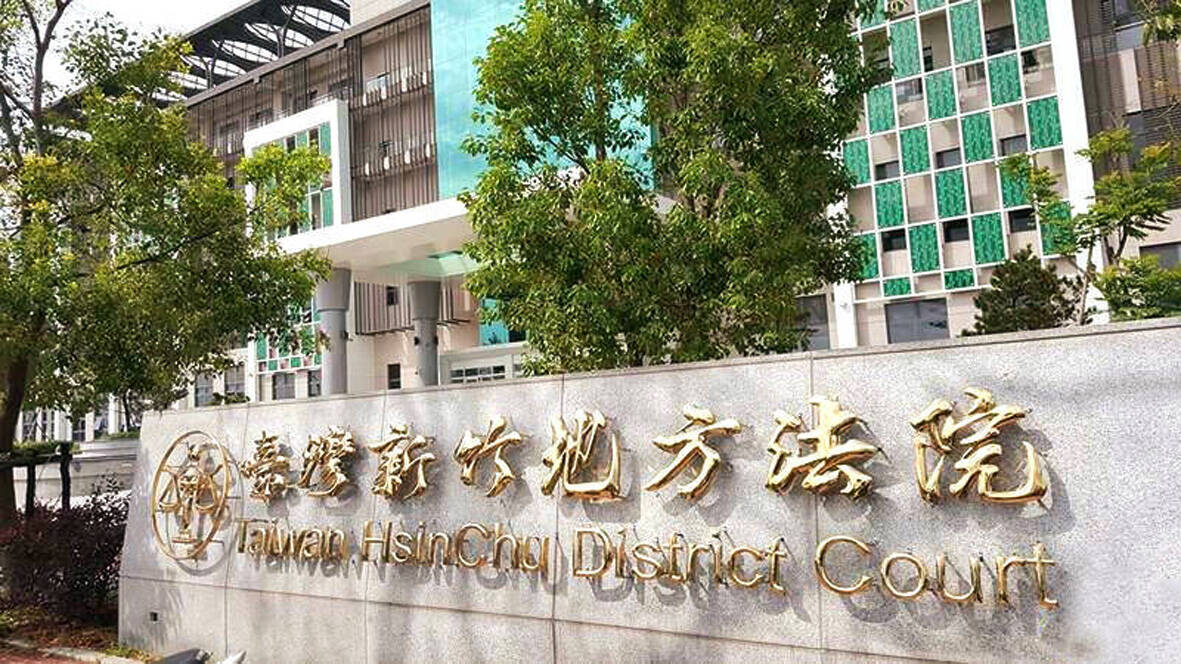The Hsinchu District Court has ruled in favor of a property owner who sued his neighbor over surveillance cameras, loud music, cooking odors and other disturbances.
The plaintiff, a man surnamed Chen (陳), said that his neighbor, a man surnamed Chang (張), had disrupted his daily life by pointing surveillance cameras at the rear of Chen’s house, burning incense for long periods of time, playing loud religious music and cooking with noisy fans that blew exhaust fumes toward his home.
Chen said that Chang often hung incense burners either above the shared section between their properties or outside his rear windows, allowing the smoke to spread into Chen’s backyard, which he claimed harmed his family’s respiratory health.

Photo: Tsai Chang-sheng, Taipei Times
In addition to the loud music, Chang allegedly allowed his dogs to bark day and night, disturbing Chen’s family, Chen said.
The cameras pointed at his property meant that his family could not freely use their back yard, he added.
Chang allegedly installed a kitchen exhaust pipe behind his home, which polluted Chen’s backyard and soiled his floors, Chen said.
The noisy fan emitted unpleasant odors, including dog smells and bathroom odors, which wafted onto his property, he said.
Chang told the court that the cameras, incense burners and exhaust fan had been removed and that there were no longer noises from dogs, music or fans coming from his property, court documents showed.
However, prosecutors said that an investigation had found that Chang had reinstalled the fan, and that disturbances from barking and loud music continued, they said.
The judge ruled that Chang is prohibited from installing surveillance cameras at the rear of his house; hanging incense burners or similar containers over shared land or outside windows in a way that allows smoke to enter Chen’s property; allowing dogs to bark in a way that bothers Chen’s family in their home; playing loud music; and, using a kitchen fan that allows noise and odors to affect Chen’s family in their home.

Temperatures in northern Taiwan are forecast to reach as high as 30°C today, as an ongoing northeasterly seasonal wind system weakens, the Central Weather Administration (CWA) said. CWA forecaster Tseng Chao-cheng (曾昭誠) said yesterday that with the seasonal wind system weakening, warmer easterly winds would boost the temperature today. Daytime temperatures in northern Taiwan and Yilan County are expected to range from 28°C to 30°C today, up about 3°C from yesterday, Tseng said. According to the CWA, temperature highs in central and southern Taiwan could stay stable. However, the weather is expected to turn cooler starting tonight as the northeasterly wind system strengthens again

Foreign travelers entering Taiwan on a short layover via Taiwan Taoyuan International Airport are receiving NT$600 gift vouchers from yesterday, the Tourism Administration said, adding that it hopes the incentive would boost tourism consumption at the airport. The program, which allows travelers holding non-Taiwan passports who enter the country during a layover of up to 24 hours to claim a voucher, aims to promote attractions at the airport, the agency said in a statement on Friday. To participate, travelers must sign up on the campaign Web site, the agency said. They can then present their passport and boarding pass for their connecting international

COOLING OFF: Temperatures are expected to fall to lows of about 20°C on Sunday and possibly 18°C to 19°C next week, following a wave of northeasterly winds on Friday The Central Weather Administration (CWA) on Sunday forecast more rain and cooler temperatures for northern Taiwan this week, with the mercury dropping to lows of 18°C, as another wave of northeasterly winds sweeps across the country. The current northeasterly winds would continue to affect Taiwan through today, with precipitation peaking today, bringing increased rainfall to windward areas, CWA forecaster Liu Pei-teng (劉沛滕) said. The weather system would weaken slightly tomorrow before another, stronger wave arrives on Friday, lasting into next week, Liu said. From yesterday to today, northern Taiwan can expect cool, wet weather, with lows of 22°C to 23°C in most areas,

Taiwan sweltered through its hottest October on record, the Central Weather Administration (CWA) said yesterday, the latest in a string of global temperature records. The main island endured its highest average temperature since 1950, CWA forecaster Liu Pei-teng said. Temperatures the world over have soared in recent years as human-induced climate change contributes to ever more erratic weather patterns. Taiwan’s average temperature was 27.381°C as of Thursday, Liu said. Liu said the average could slip 0.1°C by the end of yesterday, but it would still be higher than the previous record of 27.009°C in 2016. "The temperature only started lowering around Oct. 18 or 19